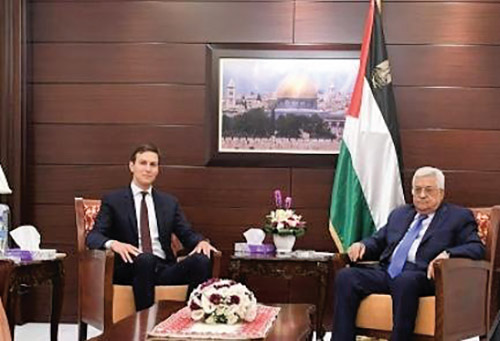
U.S. President Donald Trump’s senior adviser Jared Kushner asked Palestinian Authority President Mahmoud Abbas during their meeting in Ramallah on Thursday to freeze diplomatic initiatives against Israel for a period of some four months, in exchange for an American commitment to submit a comprehensive diplomatic plan within that time frame to kick-start the moribund peace process, a senior Palestinian official told Israel Hayom over the weekend.
Kushner was accompanied by Special Representative for International Negotiations Jason Greenblatt and Deputy National Security Adviser Dina Powell during the meeting with Abbas.
According to the Palestinian official, the Trump administration intends to formulate a diplomatic plan of action that will include a set timetable for the parties to discuss most of the conflict’s core issues. As stated, the administration has conditioned its efforts on the Palestinians’ “silence” on the diplomatic front against Israel.
Abbas agreed in principle to Kushner’s request, but asked for Trump’s personal guarantee and commitment to the plan and the two-state vision. Kushner and Abbas decided that Trump and the PA president would meet at the annual gathering of the United Nations General Assembly in New York this coming September, and that during that meeting the U.S. president will promise to present the American road map for peace currently in the works.
Trump announced via his Twitter account that he plans to meet Prime Minister Benjamin Netanyahu at the gathering of the General Assembly, while the Palestinian source told Israel Hayom that a meeting between all three leaders in New York was a possibility.
Abbas and his team have expressed skepticism over the visiting delegation’s ability to advance peace talks, and have accused Trump and his envoys of favoring Israel.
“If the U.S. team doesn’t bring answers to our questions this time, we are going to look into our options because the status quo is not working for our interests,” Abbas aide Ahmad Majdalani said.
Among these “options,” the Palestinians could look to join international bodies and request approval to become a non-state member of the U.N.
Also part of their plan to isolate Israel diplomatically, the Palestinians intend to petition the International Criminal Court at The Hague to investigate senior Israeli defense officials and diplomats for alleged war crimes and crimes against humanity since 1967.
Meanwhile, the pan-Arab daily Al-Hayat over the weekend reported that Kushner told Abbas that Prime Minister Benjamin Netanyahu was unable to order a complete construction freeze in Judea and Samaria because doing so could “lead to the collapse of the coalition.”
The White House later said in a statement that “the Palestinian Authority and the U.S. delegation had a productive meeting focused on how to begin substantive Israeli-Palestinian peace talks. Both sides agreed to continue with the U.S.-led conversations as the best way to reach a comprehensive peace deal,” the statement said.
A Possible Game-Changer?
Senior Washington Post columnist David Ignatius on Thursday concluded that “the opportunities for trade, investment and security cooperation between Israel and the Arabs have never been greater.”
According to Ignatius, the current situation in the Middle East, where Sunni Arab states view Iran as a common enemy and scorn Hamas, may have the unique potential to dramatically change the regional dynamic.
Ignatius quoted a senior White House official who said the American team came away from its latest Middle East visit hopeful that the new generation of Arab leaders is a potential “game-changer.”
According to Ignatius, Prince Khaled bin Salman, the Saudi ambassador to Washington, said that his older brother, Crown Prince Mohammed bin Salman, “is optimistic in light of the commitment of Donald Trump to achieve a just and lasting peace between Israel and the Palestinians.”
He added that this week’s visit “cemented Saudi and other Arab officials’ respect” for Kushner and his team.
Ignatius notes that a key element of Trump’s strategy is to broker Palestinian reunification, such that Abbas would also be responsible for Gaza. The Americans believe that making Abbas the pan-Palestinian leader will open the door for regional talks with Israel and a peace conference with important Arab states.
The Trump administration, Ignatius wrote, “seems to envision an ‘outside-in’ strategy for breaking the Palestinian-Israeli stalemate…. Trump’s unusually close relations with both Israel and the Gulf Arabs are part of this strategy.”
While offering the sobering reminder that numerous peace initiatives have failed in the past, Ignatius says the Trump administration is “exploring new approaches for easing the Israeli-Palestinian conflict that build on talks with a budding Sunni Arab coalition of Saudi Arabia, the United Arab Emirates, Egypt and Jordan.”
By Daniel Siryoti, Erez Lin, News Agencies and Israel Hayom Staff (exclusive to JNS.org)










